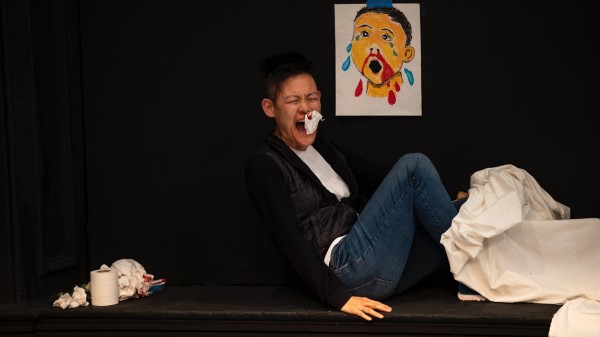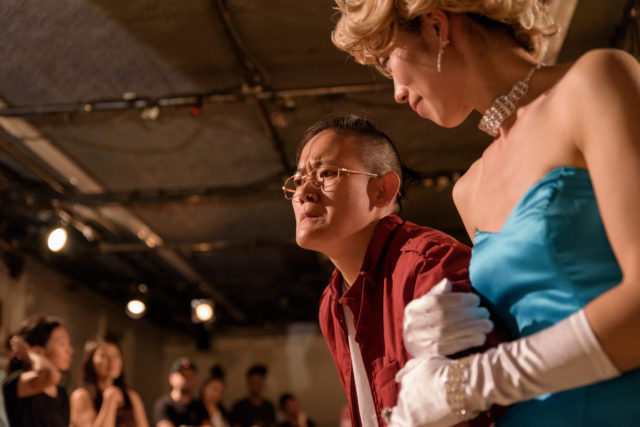
Aya Ogawa portrays their son and father in new play at Japan Society (photo by Maria Baranova)
THE NOSEBLEED
Japan Society
333 East 47th St. at First Ave.
October 1-3 & 7-10, $30
212-715-1258
www.japansociety.org
ayaogawa.com
“The Nosebleed chronicles my journey of confronting what I think is one of the biggest failures of my life, which is that when my father died almost fifteen years ago, I failed to do anything to honor him or his life because of the nature of our relationship,” Japanese American playwright-director Aya Ogawa says in a promotional video for their latest work, the final version of The Nosebleed, running October 1-3 and 7-10 at Japan Society. The absurdist, comic show, previously known as Failure Sandwich and in which four actors play Ogawa while Ogawa portrays their own son and father, serves as a healing ritual for Ogawa and the audience, especially as the coronavirus crisis continues and nearly everyone has experienced some kind of loss.
Over the summer, the Tokyo-born, Brooklyn-based Ogawa, a 2021 Barbara Whitman Award finalist, mounted an online version of Ludic Proxy, an interactive virtual play that takes place in the past (Pripyat, post-Chernobyl), the present (Fukushima, post-disaster), and the future (New York, underground), inspired by the death of their mother. Ogawa previously adapted the text for Alec Duffy’s Our Planet, an immersive production that led a small audience through the historic Japan Society building; they have also directed Haruna Lee’s Obie-winning Suicide Forest at the Bushwick Starr and A.R.T./New York Theatres (where its run was cut short by the March 2020 lockdown) and have written and directed Oph3lia at HERE, Journey to the Ocean at the Rubin Museum, Artifact at the Performance MIX Festival, and A Girl of 16 at Clemente Soto Velez’s Latea Theater.
Copresented with the Chocolate Factory, The Nosebleed is performed by Ogawa, Lee, Drae Campbell, Peter Lettre, Aya Saori Tsukada, and Kaili Turner. I have seen Ogawa at numerous events at Japan Society, where they used to work in the Performing Arts department, but now they are returning as the center of attention. “To be able to come back there, as an artist, and to be so welcomed by former colleagues, is a huge blessing,” they explained. Opening night will be followed by a reception with the artists.
Taking a break from rehearsals, Ogawa discussed motherhood, family relationships, the immigrant experience, theater during the pandemic, and more with twi-ny.
twi-ny: The Nosebleed deals with your complex relationship with your father; Ludic Proxy was partly inspired by the loss of your mother. In researching and writing each work, did your thoughts about your parents, and your relationship with them, change?
aya ogawa: Ludic Proxy was an exploration of my own grieving process — an exercise in imagining how to find the strength to continue living after the death of my mother — had I not had children of my own. It was less about my actual relationship with her, so I would say in that case, my relationship with her did not change.
The Nosebleed, however, is explicitly about my father and my relationship with him — my perceptions and memories of him (which are subjective and flawed). The process of writing the play forced me to recall and examine a lot of things I had not thought of for many years, and this revisiting and especially the embodying of his character has definitely changed my feelings toward him.
twi-ny: How has The Nosebleed developed from earlier iterations at BAX and the Public?
ao: The script is not that different from when it was presented at the Public. (I wrote in a new character after my showing at BAX). However, the staging for each presentation has been unique and tailored to each space. I’ve been blessed to retain most of the original cast. I’ve had to replace one actor (who is now in grad school abroad), and I feel blessed again to have found someone who is not only a stellar performer but a collaborator who is able to bring her whole self and lived experience into the rehearsal room.
twi-ny: What was the rehearsal room like?
ao: We have very strict COVID safety protocols in place, which I discussed with the company before we began this process. I’d heard nightmares about other shows shutting down or having to replace actors, etc. I can’t afford to replace actors, or stop a rehearsal process and pick it up again at another time, so I had to plan for the most conservative measures to keep us all safe. Everyone on my team is fully vaccinated, rehearse masked, take PCR tests every week, and have rapid home tests available if anyone is feeling under the weather.
Despite all of these measures, or perhaps because of the assurance and safety they provided, the process has been joyful and very productive. The piece was originally conceived as an immersive performance, but we have decided to prioritize safety and put the audience in the house.
twi-ny: In the show, you play your son and your father, linking three generations. What is that experience like every night onstage?
ao: This is the first time I have ever appeared in my own play. It was never something I craved doing; in fact, the thought is kind of embarrassing. I decided to appear in the play as my father because the piece demanded it. The crux of this piece, and for it to work as it was intended — as something transformative and healing — I had no choice but to take responsibility for it and play the part. The experience of playing my son and my father is cathartic and exhausting.
One thing that really came to the forefront when creating an autobiographical play was just how violent the act of embodying a character can be. It takes a great deal of responsibility and trust to hand over the portrayal of my life to other people, and trust is needed in both directions.

Aya Ogawa wrote, directed, and stars in The Nosebleed (known as Failure Sandwich in an earlier iteration above) (photo © Ryutaro Mishima)
twi-ny: For your work in progress Meat Suit, you describe motherhood as a “shit show.” You have two children; what was the pandemic lockdown like for you and your family?
ao: At first, it was kind of wonderful. Suddenly we had so much time together, so much unstructured time. There was no panic to make lunches or rush to get them to school on time, etc. We spent time gardening, cleaning the house, cooking. But then, of course, we figured out how to function in the lockdown. School happened on Zoom, as did a lot of my work. I was grateful to have work, and it was a fruitful time, in many ways, to be forced to develop work with great limitations, but it was also exhausting. Pandemic parenting continues right now — and remains pretty trying.
twi-ny: Do you still have family in Tokyo? If so, how often do you generally go back, and have you been able to do so recently?
ao: I am the only person in my immediate blood family living in the U.S. All of my relatives and family are in Japan. Since having kids, I have made it a point to visit every summer. We have not been able to visit since 2019 and it’s really painful.
twi-ny: This past March, you reimagined Ludic Proxy as an interactive online production. What are your thoughts about streaming theater? Do you see it as just a stopgap, or do you anticipate creating more online work in the future?
ao: The second act of Ludic Proxy was conceived with video game mechanics embedded into the script, so it was clear to me that it could very naturally translate to the screen as long as we could retain the audience interactivity. I actually don’t think the pandemic is going to ever “go away,” so it is important for theater-makers to think about how our medium is being transformed. As soon as The Nosebleed closes, I’m going into a video shoot for a puppet play that was originally conceived as a live, in-person puppet show but is now a performance film made for camera.
twi-ny: One of your themes throughout your career has been immigration and cultural identity. How has that changed for Japanese Americans since your first works, going back twenty years?
ao: The experience of the immigrant is not a static, monolithic story. It is varied and complex and ever-changing — so I can only speak for myself, not the larger Japanese-American population. I happen to be positioned in a particular place where I feel like I have access to multiple lenses — I am an immigrant myself but pass as a child of an immigrant. I have Japanese-Taiwanese-American children who I’ve made sure have access to their Japanese culture, but I’m also torn between wanting them to have their own experiences and interactions with the culture and sharing my experience of leaving Japan, a deeply sexist culture. Japan can be rich and beautiful. It can also be toxic and suffocating. So can America.